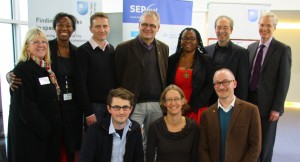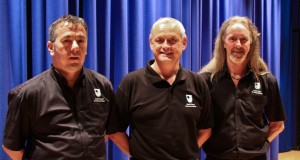
Dr Richard Holliman, The Open University
Teamwork is key to successful planning
When we’re producing courses at the Open University we tend to work in teams; many of them are multi-discplinary and almost all of them combine academics with other forms of professional expertise (e.g. editors and media professionals). For example, the last course I chaired (with the catchy code, SH804) involved more than 70 people during the production phase (including academics, media professionals, editors, librarians and web developers).
Over the years I’ve been lucky enough to work with some excellent colleagues in various course teams. You might expect me to say that. But it’s not always straightforward working as a social scientist in a Faculty of Science. One of the many colleagues I’ve really valued working with is Professor Simon Kelley. We worked together as part of a larger course team on Science in Context.

Back row, l-r: Janet Goss, Diane Ford, Gareth Davies, Andrew Norton, Janice Ansine, Simon Kelley and Tim Blackman. Front row, l-r: Frazer Bird, Clare Warren and Richard Holliman. Photo: Kate Bradshaw
Serendipity meets planning for diversity and inclusion
Spin forwards several years: I’d been working on the Engaging Opportunities project for about nine months when we began to think seriously about organising the first of the three annual lectures that we’d promised RCUK we would deliver.
A conversation with Simon Kelley at the regular departmental coffee morning led to a collaboration with colleagues from the Denbigh Teaching School Alliance, Centre for Physical and Environmental Sciences (CEPSAR), eSTEeM, the OU’s AV team and our Research, Scholarship and Quality Unit.
Science Matters: A programme of open lectures
We put together a programme of lectures that illustrated different aspects of physical and environmental sciences. We weren’t trying to be comprehensive; rather we wanted to illustrate diversity in disciplinary backgrounds and the ways that scientists conduct their research. Similarly, we wanted to demonstrate different types of career where scientific training plays a central role. And finally, we wanted to illustrate the different stages in a scientific career, and that these choices were equally open to women and men.
These decisions resulted in four shorter lectures rather than a single speaker, followed by an opportunity to ask questions as the four speakers returned to the stage for a panel Question and Answer session. All of this was recorded by our excellent AV team.
Assessing performance
Given this was a new format to us we also wanted to evaluate this activity. We decided on a ‘pre-‘ and ‘post-survey’ strategy for those attending the lectures (both directly in the lecture theatre and via the webast).
Our speakers were also happy to blog about their talks and to be interviewed about their experiences. We also interviewed a group of students from Denbigh School. The lessons we learn from this evaluation will help us to co-develop future interventions.
After several months, countless meetings, and couple of dress rehearsals, we were delighted to have Professor Tim Blackman, Pro Vice-Chancellor (Research, Scholarship and Quality) introduce our four illustrious speakers to a packed lecture theatre and to a live webcast. You can watch Professor Blackman’s introduction below.
You can read the blog posts and watch recordings of the lectures at:
- Dr Clare Warren, Senior Research Fellow, ‘Sweat, mud and leeches’
- Professor Andrew Norton, Professor of Astrophysics Education, ‘Exoplanets and how to find them’
- Frazer Bird, Postgraduate Research Student, ‘The past is the key to the future’
- Janice Ansine, Project Manager, ‘iSpot: your place to share nature’ (post in preparation)
An undertaking on this kind takes an awful lot of organisation and I’m extremely grateful for all the people that made this happen. Special mentions go to Janet Goss, Diane Ford and Clare Warren who all ‘went above and beyond the call of duty’ to ensure this event was a success.
The final call goes to the students and teachers that attended the lecture, either in the lecture theatre or via the webcast. Thanks for making this a success. We look forward to futher engaging with you again in the future.

